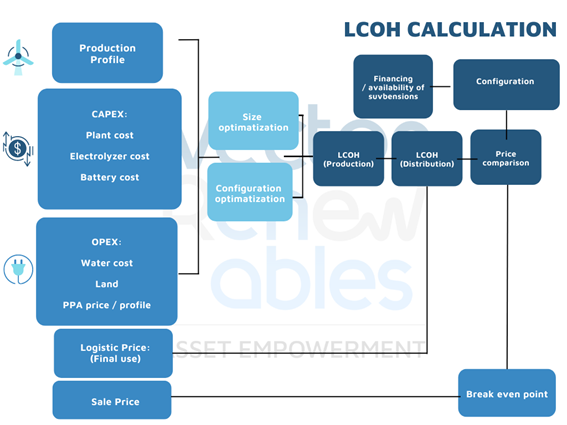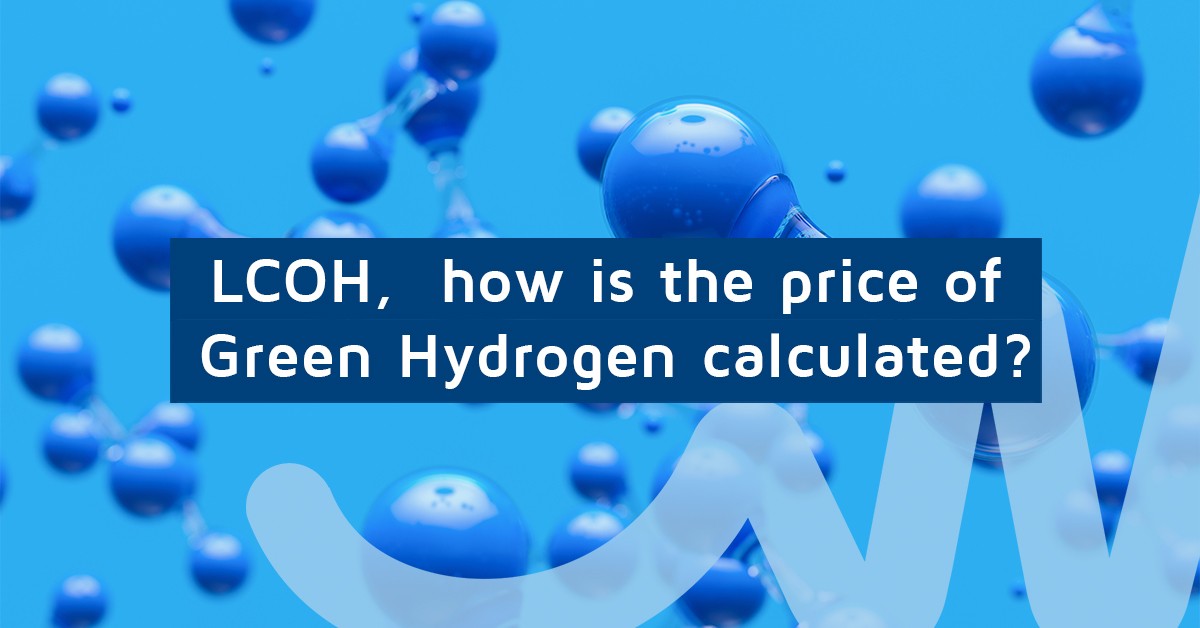LCOH, how is the price of Green Hydrogen calculated?
Green Hydrogen is the energy vector already emerging as one of the key tools to achieve global decarbonisation.
Driven by climate urgency and countries' commitments to net zero emissions production, IRENA estimates that Hydrogen will account for up to 12% of global energy use by 2050. These same studies also predict that the cost of hydrogen installations could decrease by 40% to 80% in the coming years. This article tells you how hydrogen prices are set and what variables are involved in the matrix.
The Levelised Cost of Hydrogen (LCOH) is a variable that indicates how much it costs to produce 1 kg of Green Hydrogen, taking into account the estimated costs of the investment required and the cost of operating the assets involved in its production.
Thus, we can say that, in order to obtain this calculation, all the relevant variables that affect the production of Hydrogen are taken into account, among which are included:
-
The annual hourly production curve of the renewable resource.
This shows the energy production over a year at each hour. Naturally, it depends on the selected geographical location and its meteorological conditions, such as the level of solar irradiation and/or the wind resource. At the same time, the technology chosen for the renewable resource will also affect this critical parameter. Therefore, the more reliable the production curve information is, the more accurate it will be, leading to a more precise calculation of the LCOH, as it will tell us how much renewable energy is fed into the system -
The CAPEX capital cost
Is purchasing new equipment or upgrading existing capital to produce Hydrogen. Included in these costs is the cost of the equipment required. This will be strongly affected by the renewable energy system adopted, the electrolyser technology selected (alkaline, PEM, SOEC) and the characteristics of the auxiliary services involved, such as water treatment, the compression and cooling system or Hydrogen storage, among others. Therefore, the more precise the technology selection, the more reliable the result will be. -
The OPEX cost
Is operating and maintaining the production facility. It is the expenditure incurred in the normal operation of the plant's production. This estimate considers water consumption, the cost of renting the land, or the annual maintenance required for all the assets. An important factor to consider in this cost is the potential use of energy from the electricity grid. When the business model believes that this consumption is desirable, the Power Purchase Agreement (PPA) must be very well detailed as it will affect not only the taxonomy of the Hydrogen produced but also the financial modelling.
The size of the electrolyser will be optimised through these three main parameters, considering the best power supply configuration, according to the previously described points.
Furthermore, depending on the state of aggregation of the Hydrogen for its final consumption, its temperature and pressure requirements for logistical reasons, and the potential purchase price of the sector that acquires it, there will be different margins adapted to each situation which will condition the LCOH.
With the analysis and consideration of all the above variables, it will be possible to study and determine the break-even point for the proposed business model. With this, different modelling scenarios are assumed and calculated, and a ranking of the best options for each case study is established. The final result will also be impacted if external grant funding is available, which will favour the LCOH calculation.
Vector Renewables has a Hydrogen department led by Stefano Socci, Hydrogen Strategy and Origination Manager. For any comments or collaboration, do not hesitate to write to our website or contact Stefano directly through his personal email atThis email address is being protected from spambots. You need JavaScript enabled to view it. .
When you subscribe to the blog, we will send you an e-mail when there are new updates on the site so you wouldn't miss them.

